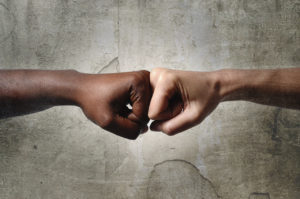Is it Time to Give Up on Forgiveness among Black and White South Africans?
By Dion Forster


Is it time to give up on forgiveness among black and white South Africans? Yes—at least in the way forgiveness has come to be understood in the popular South African imagination.
Current research shows that black South Africans are asking why white South Africans want to be forgiven. So that they can be free from the guilt of apartheid without dealing with its consequences? So that they don’t have to deal with the difficult issues of land and economic redistribution? The Institute for Justice and Reconciliation reports that a large percentage of South Africans feel that forgiveness remains impossible while the majority of the population remains poor and disenfranchised.
As we approach our next National Elections identity politics and the casting of blame are certain to feature. What has contributed towards this distrust among black and white South Africans?
First, is the brutal history of colonialism and apartheid in South Africa, but also the supposed “miracle” of the New South Africa. Young black activists, such as those involved in the #RhodesMustFall and #FeesMustFall movements suggest that the compromised settlement that Nelson Mandela’s generation negotiated allowed white South Africans to retain control of the economy and to hold on to land ownership while black South Africans remain landless and impoverished. For them, the so-called “miracle” of the new South Africa is a nightmare.
The South African poet, Nathan Trantraal, in his poem Fiction en Enstrangement, tells how after the 1994 Democratic elections in South Africa, the Christian churches called upon their black members to be “Christlike,” to give up the violent struggle for liberation and to forgive their white perpetrators for the sins of apartheid. Yet, this resulted in a cheap forgiveness without justice. He says that it was a form of forgiveness that made everyone sick. Trantraal employs a play on the Afrikaans words for “forgiveness” and “poison” to point out the “gif [poison] in vergifnis [forgiveness]”.
Indeed, many black South Africans feel that forgiveness is poisonous. It requires them to make further sacrifices for the sake of social harmony while the perpetrators of apartheid get to live with their historical privilege resulting from ill-gotten gain.
So, it may not be a bad idea to give up on certain understandings of forgiveness. The philosopher and theologian, Cornell West, was once asked how he felt about persons who were losing their faith in God. He answered that giving up belief in God was not such a bad thing since the gods that many people believed in were idols. The same could be said of South African forgiveness.
“Thin” conceptualizations of forgiveness have not served South Africa. A recently concluded four year empirical study on the “politics of forgiveness” found that black and white South Africans do not agree on how forgiveness is conceptualized and what processes are necessary to realize it in society.
White South Africans understand forgiveness as individual and spiritual, in keeping with westernized Christianity’s stress on individualism. Most concede that apartheid was a sin. However, in their spiritual framework, sin is something committed against God by the individual. Thus, all that is necessary is for persons to confess their sins and receive forgiveness from God, not the offended party. Some of the white participants in the study said, “I know that apartheid was wrong. I confessed my part in it as sinful. I believe that God has forgiven me. Now we need to move on and stop living in the past.” What this perspective lacks is a recognition of the historical and ongoing harm that apartheid caused against black South Africans and the measures that may be necessary for reparation.
For black participants, forgiveness is a matter of social and spiritual wellbeing experienced as a reality in the community. Forgiveness is not so much a spiritual concept directed towards God as it is a political reality that needs to be experienced among persons. So, for this group, forgiveness begins when their land is returned, when they have a just and equitable share in the economy, and when the domination of whites and whiteness is deconstructed. The research characterized this as a “politics of forgiveness.”
That being said, a purely political, transactional approach to forgiveness would also not fully encapsulate what forgiveness entails. True forgiveness is not only a political transaction. While the possibilities of forgiveness cannot be realized without political justice, forgiveness also requires more. The South African theologian, Robert Vosloo, speaks of the “prose of justice” coupled with the “poetics of agape.” Paul Ricoeur suggests that forgiveness requires something greater than an economic act: “the economy of the gift.”
So yes, certain types of forgiveness have proven inadequate to deal with South Africa’s hardship and woundedness. We must move beyond those sentimental, weak, “justice avoiding”—indeed, poisonous—forms of forgiveness. In a nation where religion and religious institutions and leaders remain among the most trusted sectors of society—86% of the citizens self-identify as Christian—the language of forgiveness cannot be cast aside. It must encompass both economic/political justice and the “poetics of agape” that allows for social restoration as well as spiritual wholeness and healing.
#
Dion Forster is Professor of Ethics and Public Theology at Stellenbosch University. He is the author of numerous books and articles in theology and ethics. His research focuses on social ethics, economic ethics, and political ethics. Dion is the director of the Beyers Naudé Centre for Public Theology. See: http://www.twitter.com/digitaldion.
This Counterpoint blog post may be reprinted with the following acknowledgement: “This article was published by Counterpoint: Navigating Knowledge on 20 March 2019.”
The views and opinions expressed on this website, in its publications, and in comments made in response to the site and publications are those of the author(s) and do not necessarily reflect the views and opinions of Counterpoint: Navigating Knowledge, its founders, its staff, or any agent or institution affiliated with it, nor those of the institution(s) with which the author is affiliated. Counterpoint exists to promote vigorous debate within and across knowledge systems and therefore publishes a wide variety of views and opinions in the interests of open conversation and dialogue.



